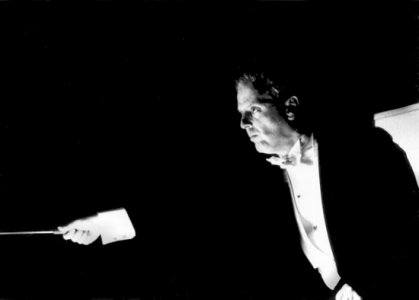 Daniel Barenboim, outgoing Music Director of the Chicago Symphony, bowed out with an unusual gesture: three final one-off performances, each dedicated to a valedictory 9th Symphony by three greats of the Austro-German repertoire: Mahler, Bruckner, and Beethoven.
Daniel Barenboim, outgoing Music Director of the Chicago Symphony, bowed out with an unusual gesture: three final one-off performances, each dedicated to a valedictory 9th Symphony by three greats of the Austro-German repertoire: Mahler, Bruckner, and Beethoven.Mahler. The first of these Abschied-concerts, Thursday night at Chicago's Orchestra Hall, showed this conductor-orchestra combination at their mind-bending best. When a great orchestra with an often-great leader actually performs greatly, all bets are off: and so it proved with Mahler's 9th.
Barenboim's reading was trenchant and distinctive, cueing off Mahler's fade-out ending to color the entire performance. The opening bars of the Andante comodo had a vague, grey sound, string tone stripped of color to devastating effect. The movement's exposition and development were executed in crisp, muscular style but with no harshness, the textures fully transparent even in the loudest climaxes. Almost a blend of Walter's intensity (1938) and Karajan's technical control (1982 -- both live recordings!), but distinctly Barenboim.
The second-movement Ländler (three Ländlers in distinct tempi) was tightly integrated, introducing a bit more color into the playing, with a wonderful chamber-like balance at the end. The Rondo-burleske took it up a notch, controlled intensity but with more overt expression from the players. This carried into the final Adagio, which swept everything away, somewhat fast but with unerring feel for tension-and-release. The fortissimo climax had X-ray clarity, the brass burnished, not brilliant, clearing the way to Mahler's morendo ending, the quietest possible string playing tangible in the air, the sense of relaxation as the music expires achieved by the tightest control from the podium. This was risk-taking live performance at its best.
Daniel Ginsberg, Barenboim Bids Chicago Adieu in Classic Fashion (Washington Post, June 19) James R. Oestreich, Barenboim's Warm Farewell to Chicago (New York Times, June 19) Wynne Delacoma, Barenboim's farewell is a memorable feast (Chicago Sun-Times, June 19) Andrew Patner, CSO lauds departing Barenboim as 'conductor for life' (Chicago Sun-Times, June 19) John van Rhein, Barenboim, Beethoven rule (Chicago Tribune, June 19) Michael Henderson, Goodbye Chicago, hello world (The Telegraph, June 20) Jeremy Grant, Indelible stamp on Chicago Symphony (Financial Times, June 20) |
Bruckner. On Friday night Barenboim and the CSO took on Bruckner's 9th, preceding it with five of Pierre Boulez's Notations for orchestra (for large orchestra, inspired by but not transcriptions of piano works from the '40s). These were brilliantly done, every percussion instrument of the past two centuries employed, coloristic in the extreme, but at times (nos. III and IV) ready to burst into traditional rhythms (march, dance) but never quite doing so.
The Bruckner was very well played, with broad tempi, careful balancing of orchestral choirs, and an Old World blending of tone that one does not always associate with the Chicago orchestra. That said, unlike the previous night's Mahler, the performance seemed something less than the sum of its excellent parts: it lacked the sense of epic inevitability this symphony should convey. In fairness the Bruckner 9th is a surprisingly difficult work to bring off. If played for monumentality it can be boring; if for passion it can seem overwrought. Falling between the two, Barenboim did not quite bring it off despite many fine moments (the low brass in the opening paragraphs, the articulation of the massive climaxes in the Adagio). Indeed a Furtwängler-like fluidity seemed to break into the performance at times, and then the performance really came alive.
Both concerts received prolonged standing ovations, an expression of appreciation to the departing director, whose tenure has been controversial, but deserved for the Mahler (clearly fine-tuned after Jens' critique of the 2005 tour performance). Barenboim's farewell concerts concluded with the Beethoven 9th and Choral Fantasy on Saturday, not heard by this reviewer.
What's most interesting here..and somewhat under-emphasized by the review...is the fact that New Music was played twice in the same season! That's the only way it can sink in, and second performances are always harder to get than first ones. Perhaps lesser mortals than Carter would not get the same treatment.
ReplyDelete